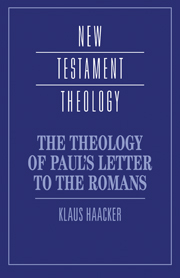Book contents
- Frontmatter
- Contents
- List of abbreviations
- 1 Introduction
- 2 Theology in a nutshell: The opening of the letter as a foretaste of what follows
- 3 Theology in process: An outline of the argument of the letter-body
- 4 Major concerns
- 5 Sorting the sources
- 6 To the Romans a Roman? The rhetoric of Romans as a model for preaching the Gospel in Rome
- 7 Romans in its canonical context
- 8 The impact of Romans and interactions with Romans in Church history
- 9 The relevance of Romans reconsidered
- Further reading
- Index of authors
- References
- Index of subjects
5 - Sorting the sources
Published online by Cambridge University Press: 05 June 2012
- Frontmatter
- Contents
- List of abbreviations
- 1 Introduction
- 2 Theology in a nutshell: The opening of the letter as a foretaste of what follows
- 3 Theology in process: An outline of the argument of the letter-body
- 4 Major concerns
- 5 Sorting the sources
- 6 To the Romans a Roman? The rhetoric of Romans as a model for preaching the Gospel in Rome
- 7 Romans in its canonical context
- 8 The impact of Romans and interactions with Romans in Church history
- 9 The relevance of Romans reconsidered
- Further reading
- Index of authors
- References
- Index of subjects
Summary
In the previous chapters on major concerns of Paul in Romans we concentrated on the contents of this letter or on the message which the apostle tried to bring home to its readers. Our method consisted mainly in a close reading of what Paul is saying. Now we enter a different level of interpretation. Instead of simply tasting the dish, we try to find out its ingredients. By ‘sources’ we do not mean the innermost origins or reasons of his teaching in Romans (we shall not try to understand Paul better than he understood himself!), but the sources from which he draws his argument. Some of them may have been part of his earliest education in the home or in school (possibly under the eyes of Gamaliel the Elder, see Acts 22 :3), before or after that time in Jerusalem also at Tarsus in Cilicia. Some traditions will have been transmitted to him when he joined the Church (though he attempts to downgrade the importance of such teaching in Gal. 1:12 – at least as far as the essence of the Gospel is concerned). But no doubt Paul continued to learn from the intellectual environment of his later ministry, from dialogue with the people he tried to win over to faith in Christ, and from conversations with converts in the various communities he founded or visited. To identify these inputs can contribute to a deeper understanding of the process of communication that is going on in this letter.
- Type
- Chapter
- Information
- The Theology of Paul's Letter to the Romans , pp. 97 - 112Publisher: Cambridge University PressPrint publication year: 2003

